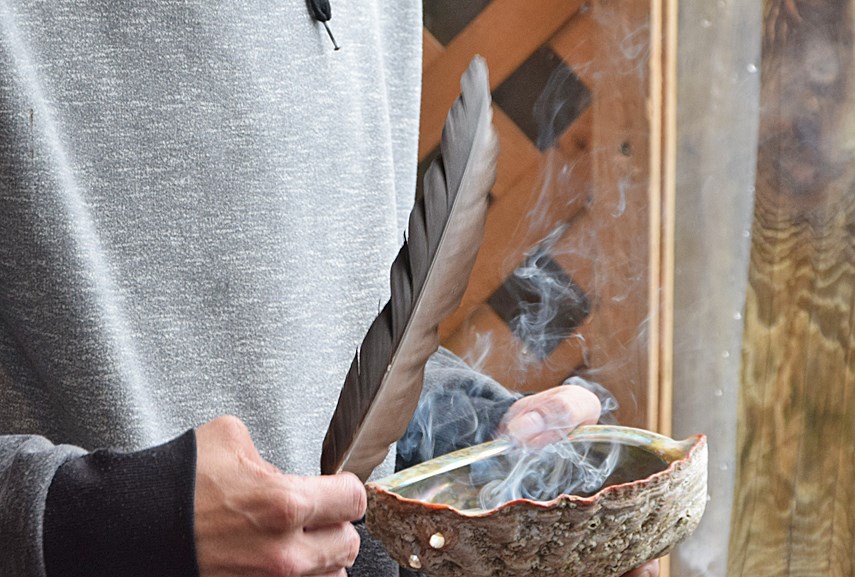The times, they are a changin’. And not everybody’s good with it.
Earlier this month, the B.C. Supreme Court ruled that Indigenous smudging and hoop dance ceremonies held in a Port Alberni elementary school did not infringe upon religious freedoms.
The complainant was a Port Alberni mom and evangelical Christian who argued that the smudging ceremony violated her daughter’s religious freedom and caused her to experience “anxiety, shame and confusion as a result.”
At the time of the incident in 2015, her daughter was in Grade 5.
Let me see … where to begin?
How about … the fact that the ceremony, which involves burning a small sweet grass bundle, was a way of introducing Indigenous cultural practices to local school children? Not so long ago, those practices were brutally repressed for more than 80 years in a nearby residential school.
The school is on the traditional unceded land of the ćišaaʔatḥ (sis sha ahtah –Tseshaht) and the Hupač̓asatḥ First Nation, both members of the Nuučaan̓uł (Nuu-chah-nulth Nations), or as they were known by the colonists, the Nootka people. We just moved in on them; yet they are still generous enough to share their culture.
The complainant argued that the classroom smudging ceremony was “an echo of the gross abuses of the residential school days where First Nations children were taken from their homes, deprived of family support, and compelled by the state to participate in religious practices against their will.” Supreme Court Judge Douglas Thompson called that insensitive and regrettable hyperbole, “especially considering the magnitude of what occurred a few kilometres down the road during the 82 years that the Alberni Indian Residential School was open.”
The ceremony was not held just for the edification of the descendants of colonizers. Judith Sayers, president of the Nuu-chah-nulth Tribal Council, which was an intervenor in the case, wrote in the Tyee that about 30 per cent of the kids in the district are Nuu-chah-nulth, who graduate at half the rate of non-Indigenous students.
“Studies have shown that where culture is used and taught in a school, students thrive,” she said. “We need our children to succeed in the system.”
I’m not qualified to comment, nor will I speculate on why the complainant’s daughter experienced anxiety, shame and confusion. But I’m not sure things improved after seven lawyers argued for five days in a courtroom. After that, that courtroom might benefit from a smudging ceremony.
And speaking of anxiety, etc., imagine how Judith Sayers and her people felt when told their culture and spirituality featured demonic, dark powers in unseen supernatural worlds?
Seriously? And Christianity doesn’t?
We’re at that point where some people have started weaponizing human rights – if my children have to endure smudging ceremonies and hoop dances, why can’t they say the Lord’s Prayer or recite the 10 Commandments (King James version)? It wasn’t so long ago that Christianity enjoyed singular status as a state religion, even though we were supposed to maintain the separation of church and state. For good reason, Torquemada. Anyone pining for the good old days can always go to a religious school.
For the rest of us and our children, public education attempts to teach open-mindedness and generosity, despite social media. Talk about a tough job.
It’s possible that Smudgegate is not over. The complainant is considering an appeal, aided by an outfit called the Justice Centre for Constitutional Freedoms, which advocates “freedom and equality for each and every Canadian.” Including First Canadians, presumably. So why all the lawyers?
Change is hard for some people. I can earnestly argue that bringing Indigenous cultural practices into the classroom promotes freedom and equality for each and every Canadian, and I’ll get just as earnestly argued against. Hopefully common sense will remain an element of the Canadian justice system, but as I write, there are people looking over my shoulder going “who gets to define common sense?”
Meanwhile, common sense is breaking out closer to home on the North Shore at Capilano University, which this month hired Miranda Huron as the university’s first director, Indigenous Education and Affairs. The appointment is a fitting milestone for a school named after Chief Joe Capilano, famed leader of the Squamish (Sḵwx̱wú7mesh) Nation of the Coast Salish people. Ms. Huron, who is a member of the Anishinaabe people, will provide strategic leadership for the university and direction for its First Nations Student Services.
And maybe hold a smudging ceremony now and then.
Journalist and communications consultant Paul Sullivan has been a North Vancouver resident since the fall of the Berlin Wall and the rise of Madonna. [email protected]
What are your thoughts? Send us a letter via email by clicking here or post a comment below.



